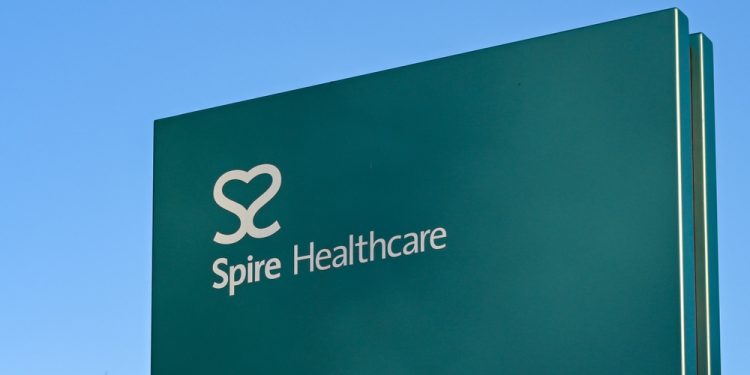Spire Healthcare has seen a boom in self-pay patients during the first half of 2021, but private medical insurance (PMI) treatment growth is expected to remain sluggish.
The hospital network added that it expects insurers to continue introducing triage services to cut costs and more directional or guided care networks and pathways for their customers’ treatment.
According to the group’s results for the first six months of 2021, revenue from self-paying patients hit £130m in the year to June, as elective patients returned en masse.
This figure was a record high for the business; more than double the £48m in the same period of 2020 and far surpassing the pre-pandemic £89m in H1 2019.
Income from PMI work remained the main source of revenue for Spire contributing £231m, but it only rebounded by 59% from the pandemic-hit £146m in H1 2020.
And it remained 6.3% below the £247m worth of income earned during the first six months of 2019.
“The recovery in PMI has lagged that of self-pay; while Q2 2021 PMI admissions are some 5% below Q2 2019,” Spire said.
“These have been more complex procedures carrying a higher average revenue per case leading to PMI revenue growth of 5%.”
It added: “PMI patient volumes remain below historical levels despite PMI models forecasting growth in 2021. It remains unclear how volumes will recover over the medium term.”
Spire also noted that the PMI market “remained concentrated”, with the top four companies, Bupa, Axa, Aviva and VitalityHealth having a market share estimated at over 85%.
Inflation pressure and price rises
It also appears price rises could be on the horizon for self-pay and PMI customers as Spire highlighted: “The ability for patients to access private care does not appear to be constrained financially at this time.
“The group understands that PMI policy renewals and sales remain stable, and the group has itself seen strong growth in 2021 that is expected to continue while waiting lists remain at record levels.
“In response to macro inflationary pressure we will continue to benefit from the inflation mechanisms built into the PMI contracts and will benefit from our ability to change self-pay pricing quickly via our new pricing engine.”
Loss reduced
Overall, Spire reported an after-tax loss of £17m during the six months to 30 June, almost fully rebounding from a loss of £233m in the same period of 2020, but still far below the pre-pandemic £7.1m profit in H1 2019.
This was despite overall revenue breaking £558m, more than 13% higher than in H1 2019 and 40% up on last year.
It noted the first three months of 2021 were impacted by Covid-19 to a lesser degree as it remained under an NHS contract, but April to June 2021 reflected a move back towards pre-pandemic trading.
Admissions in July and August were impacted by rising Covid-19 cases in the UK with last minute cancellations due to patients, colleagues and consultants being required to self-isolate costing the business around £4m each month.
The business also acknowledged the failed takeover attempt by Ramsay Health Care, noting it “respects the view of shareholders who did not provide sufficient votes to support [the move] and is confident that it remains well positioned for success as a standalone business”.
“This period of uncertainty is now behind us, and has not impacted the operating performance of the business,” it added.
‘Waiting lists continue to climb’
Justin Ash, chief executive officer of Spire Healthcare, said he was pleased by the performance in the first six months of the year.
“As waiting lists continue to climb, the company is helping patients find options for treatment, be that privately or by assisting the NHS,” he said.
“We are of course experiencing material additional costs arising from the complexities of delivering safe care in a Covid-secure environment, which will continue as long as case numbers remain high in the UK.
“However, we have successfully driven down the cost of Covid testing and our continued investment in digital systems and efficient pathways will deliver significant cost savings in 2022 and beyond.
“The long-term prospects for the healthcare sector are positive and we stand ready to play our part in addressing waiting lists and supporting the UK’s recovery from the pandemic.”





